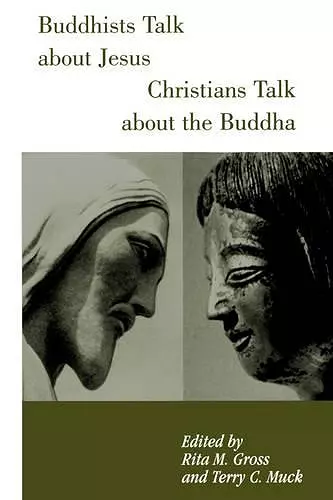Buddhists Talk About Jesus, Christians Talk About the Buddha
Rita M Gross editor Terry Muck editor
Format:Paperback
Publisher:Bloomsbury Publishing PLC
Published:1st Feb '02
Currently unavailable, and unfortunately no date known when it will be back

What does Jesus mean to a Buddhist, or the Buddha to a Christian? What is it about the Buddha that is appealing to a Christian, or unappealing? In this volume 12 scholars, six of them Christian and six of them Buddhists, speak simply and from the heart about their personal relationship to the great religious leader from the other tradition. The diversity of views within each tradition could be a shock to the average Buddhist or Christian on the street. Buddhists argue about Buddha's nature, Buddha veneration, and the role the Buddha plays in human liberation. Christians argue about Jesus' human and divine status, his uniqueness, and the role he plays in human salvation. The contributors celebrate the family likeness between Jesus and the Buddha, but they also acknowledge the differences as well, for it is at the points of difference that potentially there is the most opportunity for growth.
Originally a dedicated issue of a small, professorial journal, this set of essays has little of the musty academic's study about it. The scholarly contributors, six Buddhists and six Christians, speak personally to clearly convey the exceptions they take with either Jesus or the Buddha. The Buddhists' discomfort with Jesus arises from exclusive claims about him--that he is the unique Messiah, the unique personification of divinity, the unique facilitator of salvation. The deepest difference the Christian contributors have with the Buddha is over his stress on salvation by solitary effort, which they contrast with Jesus' invitation to salvation and promise of aid in achieving it. (John Dominic Crossan provocatively points out the class distinction between the well-born Buddha and the peasant-born Jesus. He also calls Christian exclusivity "implicitly genocidal.") -- Ray Olson * Booklist *
In a productive new approach to the Christian-Buddhist dialog, four religion scholars who practice Buddhism share their thoughts, both academic and personal, about Jesus followed by the reactions of two Christians. Likewise, four Christian "scholar-practitioners" comment on the Buddha followed by reactions from two Buddhist colleagues. Gross (Buddhism After Patriarchy) and Muck (religion, Austin Presbyterian Theological Seminary) have collected the essays, which originally appeared in the journal Buddhist-Christian Studies, and book-ended them with an introduction and closing essay. Thought-provoking enough for specialists, these articulate views from informed followers of the "other" faith are also accessible to general readers. This book is an excellent follow-up to Thich Nhat Hanh's Living Buddha, Living Christ (LJ 10/1/95) and the Dalai Lama's The Good Heart: A Buddhist Perspective on the Teachings of Jesus (LJ 7/96), which Muck discusses in the closing essay along with Kenneth Leong's The Zen Teachings of Jesus (Crossroad, 1995). Recommended for public and academic libraries. -- -James R. Kuhlman, Univ. of North Carolina Lib., Asheville * Library Journal *
Reminiscent of Thich Nhat Hanh and Daniel Berrigan's The Raft Is Not the Shore, this book brings together six Buddhists and six Christians for an interfaith conversation. Unlike that book, however, this one is eminently predictable, given the participants in the discussion: Buddhists chafe at declarations of Christian particularity, and the Christian interlocutors respond with eager disavowals of the traditional Christian claims about Jesus' uniqueness. They assert that "exclusivist" claims put forth by some Christians are not "intrinsic or necessary to Christianity"--which will come as no surprise once the reader notices that the first two Christian contributors are Marcus Borg and John Dominic Crossan. Had, say, Tom Bethel, Jan Karon, Frederica Mathewes-Green, or even Anne Lamott been invited to participate, the discussion might have gone a different route. As it stands, the book teaches us very little: we already knew Buddhists would be uncomfortable with assertions about Jesus being the only way, and we already knew that left-leaning Christians would rush to erase such assertions. This is fine as far as it goes, but many orthodox Christians will not find the tenor of the volume congenial. One is left wondering if there are no other Christian responses to the challenges of religious pluralism. * Publishers Weekly *
ISBN: 9780826411969
Dimensions: unknown
Weight: 250g
160 pages